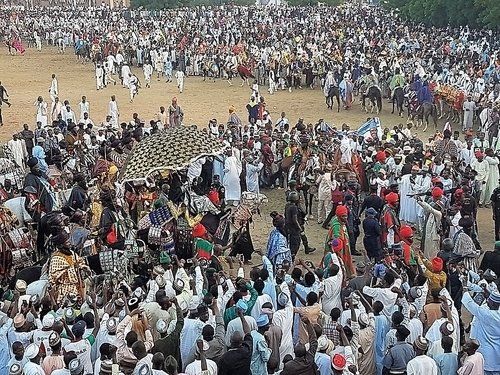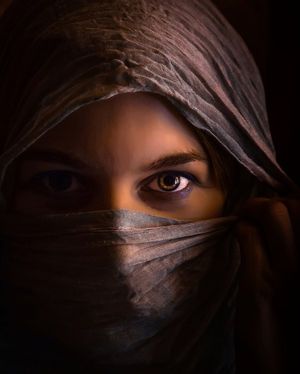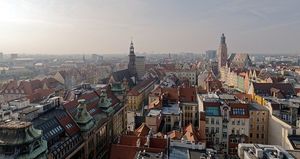One of the most respected – and beloved – doctors in our small town is from a Muslim background. Then there are the owner of the gas station, a shopkeeper, the lady wearing the hejab who runs the dry-cleaning establishment – and many more.
Should we view them differently since 11 September? Are they members of some clandestine network, terrorists in disguise? Or are they just people like you and me, with similar dreams and concerns, but who practise a different lifestyle?
Understanding
Our children grew up in Pakistan where we served for sixteen years as missionaries. The two oldest used to disappear to have a second breakfast with our Muslim neighbours, until we discovered their strategy!
Since our youngest son was born there, Pakistanis proudly proclaimed him one of their own. While we did experience some scary moments in bazaar evangelism, we found on the whole that our Muslim neighbours excelled at hospitality and friendliness.
We felt safe living in their midst – safer, I admit, than I would feel in many of our Western cities.
Trying to understand Muslims is a lot like trying to understand Christians. Imagine the confusion Muslims feel in trying to distinguish between Syrian Orthodox and Catholics, Greek Orthodox and Coptics, Pentecostals and Baptists, Anglicans and Methodists.
Muslims are just as diverse in culture and practice. Some are very modern and secular. Most love the fruits of capitalism. But there are also the militant fundamentalists, frightening in their intensity.
To make a start on understanding Islam (which means submission to Allah) we should first consider basic beliefs, called iman, that all Muslims share.
Allah and Angels
Firstly, Muslims believe in ‘Allah’, whom they view as the one true God. Stress is laid on his unity and transcendence, so that God is viewed as distant and unapproachable. Idolatry is detestable.

Although his mercy is praised, there is no concept of God as Father whose love can be experienced in a believer’s life – except in mystical sects of Islam.
They misinterpret our view of the tri-unity of God, concluding wrongly that by trinity we mean Father, Son and Mary – which they naturally consider blasphemous.
Because of this, the deity of Christ is a great stumbling block to evangelism among Muslims.
Secondly, Muslims believe in angels created from light. The devil is said to be created from fire, and is the father of another class of spirits – the jinn (from which we get genie).
Some jinn are good and some evil. Every child has an angel and a devil appointed over him and every child of Adam (except Jesus and Mary) is touched by the devil at birth.
Every believer is also attended by two recording angels. There are four archangels: Gabriel, the angel of revelation; Michael, the patron of the Israelites; Israfil who will sound the trumpet at the last day; and Azrail who is the angel of death.
Scripture and prophets
Thirdly, Muslims believe in the ‘books of God’ of which 104 have been delivered by God to mankind. Five were delivered to Moses; the Zabur to David; the Injil to Jesus; and the Quran to Mohammed.
Other books delivered to Adam, Seth, Enoch and Abraham have been lost. Several passages in the Quran urge them to consult the books that have gone before. However, the view prevails that our books (the Bible) have been corrupted, making their abrogation and correction by the Quran essential.
Fourthly, Muslims believe that God has sent 124,000 prophets (Nabi) and 315 apostles or messengers (Rusul). Nine, (Noah, Abraham, David, Jacob, Joseph, Job, Moses, Jesus, and Mohammed) are given prominence. Six including Christ are given special titles (Christ is called Ruh Allah-the Spirit of God).
They claim that prophets were sinless messengers of God sent to warn, rebuke, teach and remind people of God’s law. Mohammed is proclaimed as the seal and final prophet, the Apostle of Allah.
In practical Islam he is venerated in song, calligraphy and life to the point of deification. Orthodox Muslims, however, such as the Wahabis of Saudi Arabia, deny this veneration.
Judgement, heaven and hell
Fifthly, Muslims believe in the Last Day, a day of judgement and resurrection. In their view, Jesus will return to Jerusalem in the early stages of this protracted period of resurrection.
At the end, Jesus will defer to Mohammed who will intercede for Muslims and each will be judged from his own book of deeds. All deeds and words will be weighed on a balance scale.
There is no way of salvation in Islam other than by works. Hence assurance, even for Mohammed himself, is impossible.
Heaven, as described by Mohammed, is a paradise of wine, women and material pleasure. Hell has seven divisions including a kind of purgatory for Muslims to become purified.
The degree and duration of punishment depend on the sins committed. However, infidels who say that God is a plural being will remain in hell . Islam seems to teach that hell is not everlasting.
Sixthly, Muslims believe in predestination. God is absolute in his decree of good and evil. According to Muslims, God is not limited by any consideration such as righteousness or holiness.
His will is a fiat will. A tradition states that God’s attitude is: ‘These to heaven and I care not, and these to hell and I care not’. The resulting fatalism makes man a puppet.
Pillars of practice
Besides these basic beliefs, all Muslims share five pillars of practice.
Firstly, people become Muslims by a simple recitation of the creed: ‘There is no God but God, and Mohammed is the Apostle of God’. The creed is repeated in Arabic in all kinds of situations.
Secondly, Muslims are called to ritual prayer five times a day. Before prayer the shoes must be removed, the feet, hands and face washed, and the face directed towards the Kaaba in Mecca.
These ablutions are important to prayer, which consists mainly of memorised phrases in Arabic and certain postures (although personal requests may be inserted). On Friday afternoons Muslims gather for corporate prayer and a sermon in the local mosque.
Thirdly, every Muslim adult who is sane and owns property above a specified limit is required to give alms to be used to help the poor and those serving God.
Ramadan
The fourth practice is that Ramadan (the ninth month in the Muslim lunar calendar) is set aside for fasting, which is believed to cleanse excusable sins.
All, except children and those who are sick, infirm, or travellers, must abstain from food and water from sunrise to sunset every day during this month.
Meals are taken before dawn and after sunset.
Fifthly, all adults should, if possible, make a pilgrimage to Mecca once in their lifetime. Specific rituals and dress govern the pilgrims.
Jihad
Besides these five, there is a sixth – jihad – which is incumbent on all able-bodied male Muslims in order to advance Islam and repel its enemies. Muslims who die in a jihad are assured of special privileges in paradise.
In Islamic theology the world is divided into two realms; ‘the abode of peace or Islam’ and ‘the abode of war or non-Islam’ respectively. In the view of fundamentalist Muslims, Islam is always at war with non-Islam.
Jihad is a missionary duty. Since the attacks on the USA, the controversy within Islam over jihad has come to the fore.
Many Muslims living in the West have been quick to assert that Islam is a peaceful religion that practises tolerance. Mohammed Elmasry wrote in the Toronto Star: ‘Jihad is a struggle against oppression, exploitation, tyranny, fear and corruption for the establishment of justice, peace and freedom. Any type of aggressions would make jihad null and void’. Jamal Badawi of Halifax is offering a million dollar reward for anyone who finds a reference in the Quran to holy war!
Fighting infidels
Many scholars, however, point out that the Quran is full of the imagery of warfare. In a recent article in Christian Week, John Azumah explains that although a few verses in the Quran enjoin tolerance of Jews and Christians (2:256;2:40;5:69;5:86), there are many that inspire violence against non-Muslims.
‘When you encounter the unbelievers’ he quotes, ‘strike off their head, until ye have made a great slaughter among them’ (Quran 47:4).
He continues: ‘Islamic law therefore explicitly sanctions fighting, killing, enslaving and subjugating non-Muslim groups as a religious obligation on Muslims. Mohammed’s example involved personally conducting 27 battles and ordering 46 raids against non-Muslims.
‘He ordered the cold-blooded massacre of between 600 and 900 male Jews in Medina. . . . In classical Islamic writings jihad has always been used and understood to mean fighting “infidels” for the sake of Islam’ (Christian Week, 13 Nov. 2001, p.8).
Martin Regg Cohn went specifically to Pakistan to try and discover the moderate and reflective voices of modern Islam. Instead, he found many either in denial, blaming 11 September on a Zionist plot, or silenced by the power of the fundamentalist mullahs (priests).
In another article Ron Csillag alluded to the power of ‘a growing Muslim populist movement that advocates indiscriminate use of terror against civilians to achieve political aims’ (Toronto Star, 20 Oct. 2001, p. M18). This is the sad reality of the 21st century.
Freedom
Clearly, recent events have horrified the whole world. Unfortunately, many Muslims refuse to face the sources of this horror.
Muslim writer Amir Taheri writes with unusual candor in the Asian Wall Street Journal: ‘To claim that the attacks had nothing to do with Islam amounts to a whitewash. It is not only disingenuous but also a disservice to Muslims who need, one day, to cast a critical glance at the way their faith is taught, lived and practised. Even worse, the refusal to subject Islam to rational analysis is a recipe for further fanaticism’.
Muslims are incredibly diverse. Obviously, the fanatical views of Osama Bin Ladin and his ilk do not represent most Western Muslims. Many have fled their own countries in search of freedom.
Ibrahim Hayani writes about Canada: ‘It is the only country I will fight and die for because Canada has given me something my country of origin did not – freedom’ (Toronto Star, 13 Oct. 2001, p. B1).
Whatever the beliefs and practices of Muslims in our communities, two things are certain: they have been brought among us by the providence of God to become our neighbours; and we are responsible to love them with a gospel love.

















